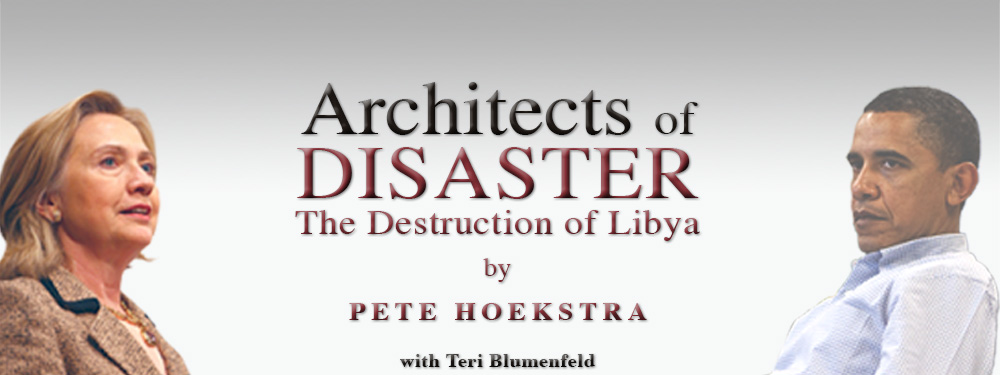By:Pete Hoekstra
Libya has steadily devolved into a lawless failed state since NATO and the U.S. assisted rebels in deposing dictator Muammar Gaddafi less than four years ago.
In the past few days alone the Islamic State in Libya claimed to have beheaded two Tunisian journalists; Turkish Airlines became the last foreign carrier to service the country due to security threats; and the United Nations indicated that it is about to give up on trying to find a political solution to the ongoing turmoil.
Libya is deteriorating into a veritable Somalia on the Mediterranean.
The situation today marks a dramatic change for the worse since we participated in a historic meeting with Gaddafi more than a decade ago.
Gaddafi had sponsored terror throughout Europe – most notably the Pan Am 103 bombing that killed 270 people – and committed unspeakable atrocities against his own people during much of his 41-year reign.
Yet around the turn of the century the “Mad Dog of the Middle East,” as President Reagan famously characterized him in the 1980s, began sending signals that he might be willing to engage with the West and change his dangerous and unpredictable behavior.
In 2004, the State Department requested that I, as a member of the House Intelligence Committee, meet with Ghaddafi in person to evaluate his seriousness. A willingness to admit to his transgressions, compensate the victims of his terrorist activities, and relinquish his chemical and nuclear weapons programs would greatly improve his status as a pariah in the free world community.
Most importantly, Gaddafi could help to stabilize the northern coast of Africa, which provides access to the soft underbelly of Western Europe. Geographically, Libya could not be more strategically significant.
Fortunately Gaddafi acceded to the demands of the West, and for a time Libya became that anchor of stability for which we had hoped. Unfortunately it all changed in 2011 when his past finally caught up with him and his long-oppressed countrymen revolted. Libya has struggled to implement a capable democratic and representative government ever since.
Warring factions and radicals continue pulling it apart. Islamists forced the internationally recognized government out of Tripoli. Ansar Al Sharia has pledged allegiance to the Islamic State in Iraq and Syria and declared an “Islamic emirate” in the eastern city of Derna. The group now claims control of Benghazi, and according to General David M. Rodriguez, commander of U.S. Africa Command, militants have established training camps in the area.
They are exporting weapons, instability and jihadists to the Sahel, North Africa and the Middle East. Niger, Nigeria, Egypt, Tunisia and Algeria are already battling extremists within their borders, and Mali’s foreign minister is appealing for international intervention in Libya to prevent more chaos from spilling over. Western Europe has much cause for concern due to its proximity.
Libya matters as much today as it did in 2004, and the West cannot ignore the downward spiral.
As Colin Powell so eloquently said a number of years ago, “If you break it you own it.” NATO and the U.S. are morally responsible for helping it to reverse course and advance toward security and democracy to ensure that it does not become a permanent Somalia on the Med.
Throughout history, from the First Barbary War in 1805 which inspired the words “To the shores of Tripoli,” to our visit in 2004, through to today, it has been viewed as essential to maintaining order throughout the greater region.
International military assistance will placate some of the violence, but political reconciliation among the groups vying for control offers the some potential for a long-term positive result.
NATO and the U.S. helped to break Libya, and now they need to help repair it. A strong central government that can contain the threat from radical Islamists is the best outcome for which we can hope in such an increasingly fractured country. This is a critical issue that NATO and the United States cannot continue to ignore.
Hoekstra represented Michigan’s 2nd Congressional District from 1993 to 2011 and was chairman of the House Intelligence Committee from 2004 to 2007. Currently he is the Shillman senior fellow at the Investigative Project on Terrorism.


